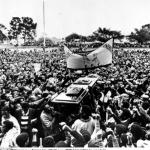Biko: And the Eyes of the World Are Watching Now

To mark Black History Month, music legend Peter Gabriel has teamed up with the non-profit Playing For Change and artists around the world to re-record his soaring 1980 anthem "Biko," inspired by the savage murder of anti-apartheid icon Steve Biko by South African police while in custody. A gifted medical student and charismatic organizer, Bantu Steve Biko was arguably the most famous martyr of the struggle against South African apartheid. Filling the void left by the ban on the African National Congress and imprisonment of Nelson Mandela and other leaders, Biko launched the South African Students Organization in 1969, and a few years later the Black People's Convention. His "black consciousness movement" sought "the cultural and political revival of an oppressed people" and stressed the need for self-reliance under the rubric, "Black man, you are on your own." His goal:"The realization by the Black man of the need to rally together with his brothers around the cause of their oppression - the blackness of their skin - and (to) rid themselves of the shackles that bind them."
Banned from politics in 1973 by the Afrikaner government, he was arrested and detained multiple times before his arrest in August 1977 for subversion. Held in Port Elizabeth, he was brutally beaten and tortured, naked and shackled, for weeks; he was finally thrown into the back of a van for a 700-mile trip to a police hospital in Pretoria, where he died the next day. With the help of complicit medical officials, police claimed he died from a hunger strike; he was later found to have extensive traumatic brain injuries, and to have died of a brain hemorrhage. His funeral service, led by Bishop Desmond Tutu, drew over 20,000 people who joined together to chant “Amandla! Ngawethu!” (Power is ours!). News of his murder led to international protests and a U.N-imposed arms embargo. No police were ever charged. Two decades later, five officers confessed to killing him; they sought amnesty from South Africa's post-apartheid Truth and Reconciliation Commission, but were denied.
Biko brings together 25 musicians from seven countries; they include the Cape Town Ensemble, the Pyramid Lake Paiute Tribe, Beninese singer and activist Angélique Kidjo, Silkroad’s Yo-Yo Ma, Congo's Jason Tamba, bassist Meshell Ndegeocello and the Taiko Project. The new Biko premiered in December as part of Peace Through Music: A Global Event for Social Justice, a virtual fundraising event in partnership with the United Nations Population Fund featuring over 200 performers. The video began streaming Friday on RollingStone.com, and was released Saturday on the Playing For Change website. The $25,000 it hopes to raise will go to social justice groups including the Population Fund, Remember Slavery Program, Bob Marley Foundation, Sankofa, Silkroad and PFC. Although Biko's apartheid government is gone, Gabriel says, "The racism around the world (it) represented has not." Myanmar, India, Turkey, Israel, China, the BLM movement - they've all "made it very clear how far we still have to go."
The man is dead
You can blow out a candle
But you can't blow out a fire
Once the flames begin to catch
The wind will blow it higher


